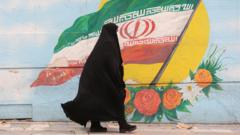Iran's controversial "hijab and chastity law," which aimed to impose stricter dress code penalties, has been paused by the National Security Council following significant backlash from rights activists and public dissent.
Iran Halts Implementation of Controversial Hijab Laws Amid Protests

Iran Halts Implementation of Controversial Hijab Laws Amid Protests
Iran's National Security Council postpones enforcement of contentious "hijab and chastity law" set for Friday amid widespread criticism.
Amidst rising tensions surrounding women's rights in Iran, the National Security Council has decided to delay the implementation of the much-criticized "hijab and chastity law." This law, intended to enforce stricter dress codes for women and girls, was set to take effect this Friday. President Massoud Pezeshkian labeled the legislation as "ambiguous and in need of reform," indicating a potential rethink of its provisions.
The proposed law would have imposed severe penalties for women and girls who violate the dress code by exposing their hair, forearms, or lower legs. It included harsher sentences for repeat offenders, with fines and potential prison terms extending up to 15 years, along with a requirement for businesses to report violators. This legislative approach has raised alarm among human rights groups, with Amnesty International condemning it as an attempt to reinforce existing oppressive structures.
Previously, during his presidential campaign in July, Pezeshkian openly criticized governmental policies regarding women’s dress, promising to respect personal choices—a stance welcomed by a younger demographic eager for change. Masoumeh Ebtekar, a former vice-president, also condemned the law, stating it represented an indictment against half the Iranian population.
The hijab debate intensified recently when Parastoo Ahmadi, a beloved Iranian singer, was arrested after performing a non-hijab virtual concert, leading to public outcry and her subsequent release. These events are reminders of broader tensions stemming from protests ignited by the death of Mahsa "Zhina" Amini two years ago, which sparked a movement against the strict dress code.
In light of the government's pause, over 300 Iranian activists have denounced the hijab law as "illegitimate and unenforceable," urging President Pezeshkian to adhere to his promises. Despite pressures from hardline factions favoring the legislation's advancement, many young Iranians remain defiant, suggesting that harsher penalties may only fuel their resistance against governmental control. The council’s decision to delay implementation signals a governmental acknowledgment of the risks posed by potential mass protests reminiscent of previous waves of dissent.
The proposed law would have imposed severe penalties for women and girls who violate the dress code by exposing their hair, forearms, or lower legs. It included harsher sentences for repeat offenders, with fines and potential prison terms extending up to 15 years, along with a requirement for businesses to report violators. This legislative approach has raised alarm among human rights groups, with Amnesty International condemning it as an attempt to reinforce existing oppressive structures.
Previously, during his presidential campaign in July, Pezeshkian openly criticized governmental policies regarding women’s dress, promising to respect personal choices—a stance welcomed by a younger demographic eager for change. Masoumeh Ebtekar, a former vice-president, also condemned the law, stating it represented an indictment against half the Iranian population.
The hijab debate intensified recently when Parastoo Ahmadi, a beloved Iranian singer, was arrested after performing a non-hijab virtual concert, leading to public outcry and her subsequent release. These events are reminders of broader tensions stemming from protests ignited by the death of Mahsa "Zhina" Amini two years ago, which sparked a movement against the strict dress code.
In light of the government's pause, over 300 Iranian activists have denounced the hijab law as "illegitimate and unenforceable," urging President Pezeshkian to adhere to his promises. Despite pressures from hardline factions favoring the legislation's advancement, many young Iranians remain defiant, suggesting that harsher penalties may only fuel their resistance against governmental control. The council’s decision to delay implementation signals a governmental acknowledgment of the risks posed by potential mass protests reminiscent of previous waves of dissent.





















